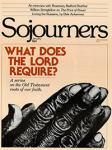What does it mean to cleave to God?
I had the privilege last November of seeing the film Say Amen, Somebody, about the origins of gospel music in this country. In part it told the story of Thomas Dorsey and how he came to write the great gospel song, "Precious Lord, Take My Hand." He had just lost his wife and child and was utterly defeated, lonely, and overwhelmed with grief. His heart poured out the words, "Precious Lord, take my hand. Lead me on. Help me stand. I am tired. I am weak. I am worn."
The spirituality of that song reflects the faith experience of black people in the United States, who have had to turn to God in their pain and in their hope for freedom. Out of that knowing of their need for God has come the most powerful spirituality that this country has ever produced: that of the black church. For poor people spirituality has meant a cleaving to the Lord, hanging on with all one's might.
Most of us in this country think faith comes out of strength. All of us, including radical Christians, have a little of the "power of positive thinking" on the inside—the "can do" American gospel. We associate spirituality with feeling strong and being in control.
We know that Jesus' parable about the Pharisee and the tax collector who went up to the temple to pray contains a warning about self-righteousness and spiritual pride (Luke 18:9-14). But it has a deeper message. The Pharisee's faith came out of his strength and perception of his own righteousness. His was a spirituality of success. But the faith of the tax collector came out of weakness and his deep sense of need. His was a spirituality of weakness and failure.
The Apostle Paul once wrote, "I have fought the good fight, I have finished the race, I have kept the faith" (2 Timothy 4:7). Thomas Dorsey and gospel singer Willie Mae Ford Smith could say those same words and add as Paul did, "Henceforth there is laid up for me the crown of righteousness, which the Lord, the righteous judge, will award to me on that Day, and not only to me but also to all who have loved his appearing" (2 Timothy 4:8). They have waited long for the Lord and therefore love his appearing; the crown of righteousness is for them, awarded to those who keep the faith.
Later in the same letter Paul tells the story of Demas, who quit the faith. Participating in Paul's ministry must have been an exhilarating experience, but Paul says Demas had deserted him because he was "in love with this present world." I do not suppose Demas was a bad person; instead, it seems that he gave in to his weakness rather than giving his weakness to God. He let go instead of cleaving to the Lord.
I am reminded of a similar discussion at a gathering of Christian communities a few years ago. We were talking about how difficult it sometimes is to lead the gospel life, of our weariness in trying to forge an alternative lifestyle and withstand the cultural pressures around us. A painful litany exists of those who have suffered the same fate as poor Demas. Many have left even after witnessing the unmistakable signs of God's presence and Spirit in action. Many have stopped cleaving to God and have fallen in love with the present world.
Faith comes out of weakness. Those who fall away and are tempted by this present world are those who forget to hang on. But those who keep the faith in the end know their weakness even more. They are not strong. They are not successful. They know their need so well that they hang on. They cleave to the Lord.
They have learned to say with the black gospel songwriter, "Precious Lord, take my hand. Lead me on. Help me stand. For I am tired. I am weak. I am worn. Through the storm, through the night, lead me on to the light. Precious Lord, take my hand. Lead me home."
Jim Wallis is editor-in-chief of Sojourners magazine.

Got something to say about what you're reading? We value your feedback!
